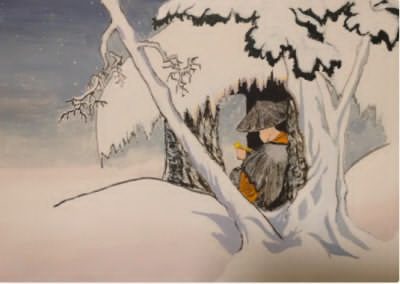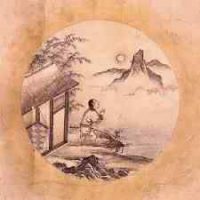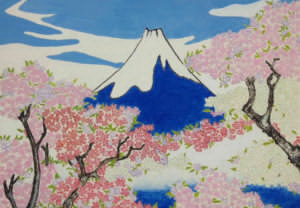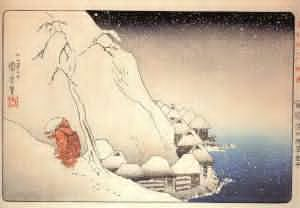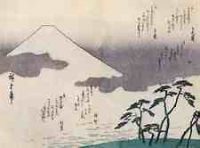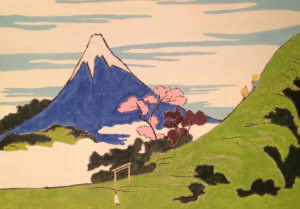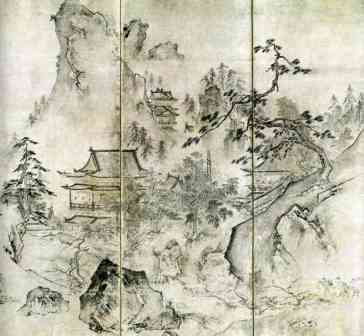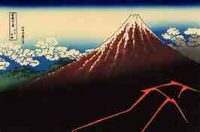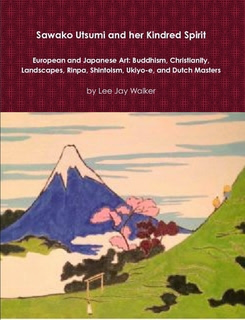Spirituality of Mountain Art in Japan: Buddhism, Shintoism, and Contemplation
Lee Jay Walker
Modern Tokyo Times
Mount Fuji in Japan is a national symbol that signifies many things to respective individuals. Yet, irrespective of the ideas generated, it is clear that national identity and spirituality predominate. Therefore, the mystery of mountains in Japan – and other nations – provides ample opportunities for artists throughout the ages to illuminate various ideas, or merely to focus solely on the beauty of nature.
In history mountains have protected indigenous communities from outside invasions, thereby, providing hope during times of turmoil and violence. Similarly, in Japan, the mountainside is a place where Buddhism and Shintoism can fuse with nature and provide solitude, escapism, religious reflections, provide an escape from the stresses of life, and other factors, including great places for tourists to connect with the bigger picture.
Naturally, famous Japanese artists including Keisai Eisen, Ando Hiroshige, Katsushika Hokusai, Tensho Shubun, Ike no Taiga, and a plethora of others, have all focused on the richness of nature in the land of the rising sun. Likewise, some artists provide a more spiritual dimension, for example, Tensho Shubun.
Not surprisingly, contemporary Japanese artists like Sawako Utsumi (art images 1, 4, and 7 in this article) who hails from Sendai, continue to highlight the sublime beauty of mountains in Japan. Indeed, Sawako Utsumi equally focuses on the spiritual dimension in relation to Buddhism and Shintoism, notably the Shinto faith. This isn’t surprising because nature is extremely potent within the Shinto faith. Also, the unique reality of this faith to the people of Japan remains visible today – irrespective if spiritual, part of the natural landscape, or based on strong cultural factors in relation to special times of the year and local festivals.
In a past article I comment, “Recently, the modern Japanese artist, Sawako Utsumi, produced two stunning pieces of art based on the fusions of ukiyo-e, the gentle influence of Shintoism and the power of nature. These two pieces of art are titled the Spirit of Ukiyo-e in the Light of Shinto and Spirit of Shinto and Ukiyo-e in the Light of Nature. Given this reality, Sawako Utsumi is focused on bringing these two art pieces together based on delightful color schemes, playing on nature, the mystery of the mind, the lasting legacy of ukiyo-e, and the endless influence of the Shinto faith that remains within easy reach.”
Sawako Utsumi continues to focus on the richness of nature and the mystery of the mountainside in relation to faith. One recent art piece, titled Spirit of Ukiyo-e Illuminated by Stunning Nature, focuses heavily on nature. Alternatively, the art piece titled Buddhist Cleric Nichiren in Exile and Homage to Yoshitoshi focuses heavily on the holy Buddhist cleric called Nichiren. In this art piece, Nichiren is in full contemplation and braving the harshness of winter by focusing on Buddhism and the blessing of solitude despite his exile.
In another article, I say “Utagawa Kuniyoshi (1797-1861) depicts beautifully the exile of Nichiren on Sado Island. In this image, Nichiren is going into exile to the backdrop of harsh wintery conditions and a sense of isolation. Yet despite the gloomy outlook, Nichiren is not looking back but moving forward. This reality would also apply to his knowledge, wisdom, and move towards Buddhahood.”
Japanese artists connecting with Buddhism, Shintoism, nature, the natural senses they felt, and illuminating the beauty of art, have all utilized the majesty of mountains. These artists, including Keisai Eisen, Ando Hiroshige, Katsushika Hokusai, Tensho Shubun, Ike no Taiga, and many others, are all national treasures because of the respective legacies they left behind. Given this reality, the splendid beauty of Mount Fuji – and other important mountains – remain visual based on past and contemporary artists (Sawako Utsumi and others) because they can be viewed at art museums, when buying books and postcards, viewing the internet, and other ways where people can connect with art and culture.
At the same time, the rich dimensions of Buddhism, Shintoism, and the mountain landscapes portrayed by Japanese artists throughout the ages all fuse naturally together.
BELOW IS A NEW BOOK BASED ON THE ART OF SAWAKO UTSUMI
Book Review: Sawako Utsumi and her Kindred Spirit
European and Japanese Art: Buddhism, Christianity, Landscapes, Rinpa, Shintoism, Ukiyo-e, and Dutch Masters
http://www.lulu.com/shop/lee-jay-walker/sawako-utsumi-and-her-kindred-spirit/paperback/product-22830732.html – Please click on to order the book.
http://sawakoart.com – Sawako Utsumi personal website
http://fineartamerica.com/profiles/sawako-utsumi.html – Sawako Utsumi and where you can buy her art, postcards, bags, and other products. Also, individuals can contact her for individual requests.
http://fineartamerica.com/featured/spirit-of-ukiyo-e-in-the-light-of-shinto-sawako-utsumi.html
Modern Tokyo News is part of the Modern Tokyo Times group
DONATIONS to SUPPORT MODERN TOKYO TIMES – please pay PayPal and DONATE to sawakoart@gmail.com
http://moderntokyotimes.com Modern Tokyo Times – International News and Japan News
http://sawandjay.com Modern Tokyo Times – Fashion
https://moderntokyonews.com Modern Tokyo News – Tokyo News and International News
http://global-security-news.com Global Security News – Geopolitics and Terrorism
PLEASE JOIN ON TWITTER
https://twitter.com/MTT_News Modern Tokyo Times
PLEASE JOIN ON FACEBOOK
